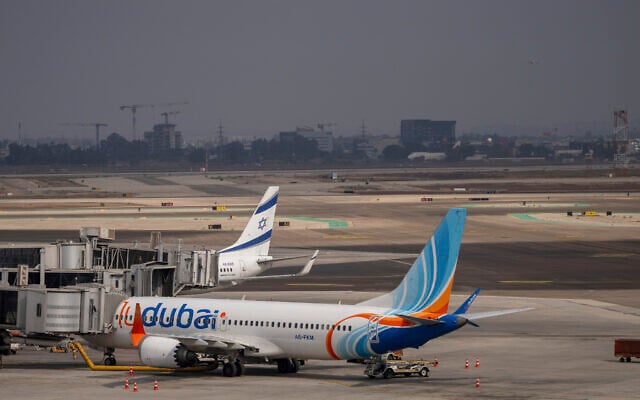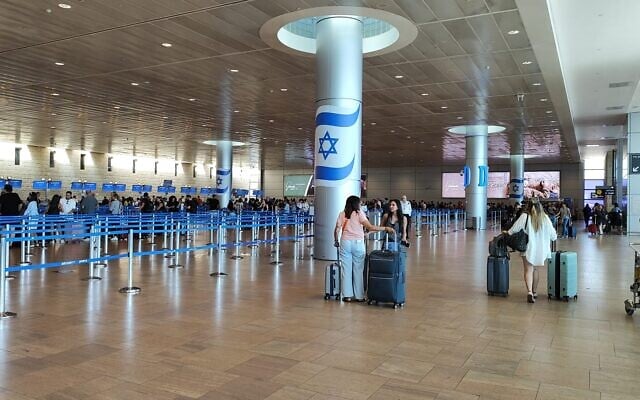Israeli lawmakers have agreed to make legal changes to canceled flight compensation rights for air passengers to help ease the financial costs of disruptions during the war period and help bring back foreign airlines to the country. The approval comes after the Finance Ministry announced a plan to grant a safety net for airlines operating flights to North America.
The Knesset Economics Committee on Wednesday approved a proposal to make amendments to the 2012 Aviation Services Law, which protects consumer rights of passengers whose flights have been canceled.
As a result, the terms and conditions of compensation paid by airlines to passengers in the event of flight cancellations will be restricted at the expense of the consumer during an emergency war period. The legal amendment still awaits the passage of a second and third reading in the Knesset before becoming law.
Since war broke out with the Hamas terror group following the October 7, 2023, onslaught on southern Israeli communities, foreign airlines have repeatedly canceled their services to and from Israel and only very few have resumed their flights in recent weeks due to the security situation.
In recent months, a group of 15 major foreign carriers started lobbying the government to make amendments to the Aviation Services Law to help reduce compensation costs and make a return of services to Israel feasible. Many foreign airlines have been grappling with a multitude of class actions and small claims from passengers who are suing for compensation as stipulated in the current law after flights were canceled.
According to the amendment, airlines that canceled flights between October 8 and November 30, 2023, as well as from April 12 to 18, August 3 to 8, and from October 1 to 5, 2024, will not be required to provide financial compensation to passengers beyond the refund of ticket fares. In addition, the period of advance notification to passengers of a flight change, to which the airlines were obligated, will be shortened from 14 days to only three days.

A Fly Dubai plane is parked on the tarmac at Ben Gurion International Airport, near Lod, November 10, 2024. (AP Photo/ Ohad Zwigenberg)
Also, during an emergency period, an airline that cancels all of its flights will have to offer passengers an alternative ticket, either from a different point of departure or to a different destination such as Larnaca, Athens, or Dubai.
In the onset of the war and depending on the security situation, the Transport Ministry in consultation with the Economy and Industry Ministry will be given the authority to temporarily suspend some of the compensation entitlements of consumers, such as limiting the obligation to provide accommodation in the event of a flight cancellation for up to two nights.
Foreign carriers have been arguing that the Aviation Services Law applies to disruptions during normal times and is not adequate for extended periods of emergency, referring to Israel’s prolonged war with Hamas that is in its 16th month.
MK David Bitan, who chairs the Knesset Economic Committee, said that without the passage of the amendments to the law foreign airlines will continue to take their planes to other places than Israel.
“We fought to reduce the harm to consumers but they are also being harmed by the fact that there are not enough flights, fares are rising and they are stranded abroad and can’t return,” said Bitan.
Speaking at the committee, Adv. Shirly Kazir, who represents foreign airlines including British Airways, said that from January, the carriers could add 50,000 seats, and many more from April if the legal amendments get a final passage.
Adv. Eyal Doron, who represents Irish low-cost airline Ryanair called for the reopening of Ben Gurion Airport’s Terminal 1, which is expected to resume operations on April 1. As low-cost carriers have been staying away, inbound and outbound flight traffic from Ben Gurion Airport has been serviced solely via Terminal 3, which charges higher fees.
“As long as Terminal 3 fees apply, we will not return,” Doron said.
Alongside the legal amendments to the compensation law, Finance Ministry representative Sapir Ifergan announced that the government is working on an assistance program to encourage Israeli and foreign carriers to operate flights to North America. According to the plan, the government will share 50 percent of the operational loss that an airline bears due to a canceled flight. The assistance will be granted to airlines that add at least two weekly flights to North America.
Israeli airlines Israir and Arkia have been in preliminary preparations to launch flights to North America as flagship carrier El Al maintains a monopoly status on the route and US carriers are shunning Israel, which is leading to a fierce shortage of seats and exorbitant airfares.



